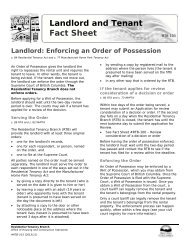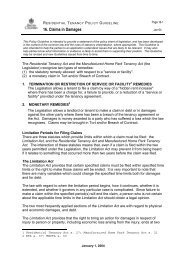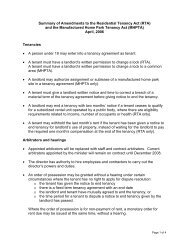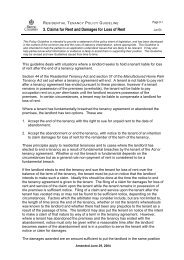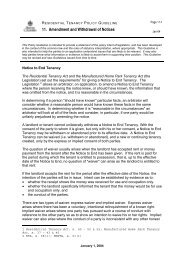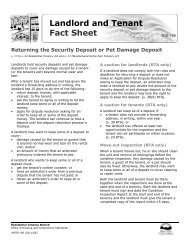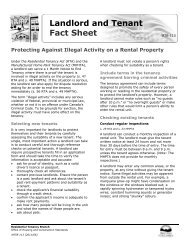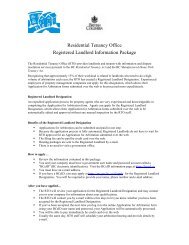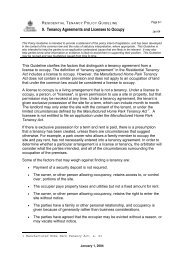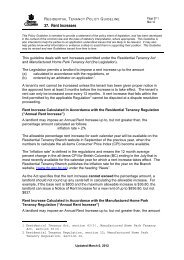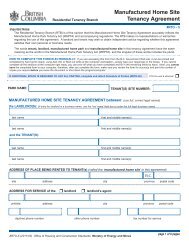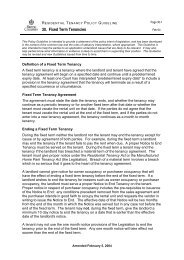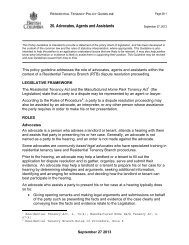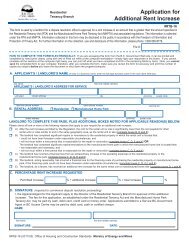Rights and Responsibilities of Co-tenants - Residential Tenancy Office
Rights and Responsibilities of Co-tenants - Residential Tenancy Office
Rights and Responsibilities of Co-tenants - Residential Tenancy Office
You also want an ePaper? Increase the reach of your titles
YUMPU automatically turns print PDFs into web optimized ePapers that Google loves.
RESIDENTIAL TENANCY POLICY GUIDELINE Page 13-1<br />
13. <strong>Rights</strong> <strong>and</strong> <strong>Responsibilities</strong> <strong>of</strong> <strong>Co</strong>-<strong>tenants</strong><br />
Jan-04<br />
This Policy Guideline is intended to provide a statement <strong>of</strong> the policy intent <strong>of</strong> legislation, <strong>and</strong> has been developed<br />
in the context <strong>of</strong> the common law <strong>and</strong> the rules <strong>of</strong> statutory interpretation, where appropriate. This Guideline is<br />
also intended to help the parties to an application underst<strong>and</strong> issues that are likely to be relevant. It may also<br />
help parties know what information or evidence is likely to assist them in supporting their position. This Guideline<br />
may be revised <strong>and</strong> new Guidelines issued from time to time.<br />
This Guideline clarifies the rights <strong>and</strong> responsibilities relating to multiple <strong>tenants</strong> renting<br />
premises under one tenancy agreement.<br />
A tenant is the person who has signed a tenancy agreement to rent residential premises.<br />
If there is no written agreement, the person who made an oral agreement to rent the<br />
premises <strong>and</strong> pay the rent is the tenant. <strong>Co</strong>-<strong>tenants</strong> are two or more <strong>tenants</strong> who rent the<br />
same property under the same tenancy agreement. <strong>Co</strong>-<strong>tenants</strong> are jointly responsible for<br />
meeting the terms <strong>of</strong> the tenancy agreement. <strong>Co</strong>-<strong>tenants</strong> also have equal rights under<br />
the tenancy agreement.<br />
<strong>Co</strong>-<strong>tenants</strong> are jointly <strong>and</strong> severally liable for any debts or damages relating to the<br />
tenancy. This means that the l<strong>and</strong>lord can recover the full amount <strong>of</strong> rent, utilities or any<br />
damages from all or any one <strong>of</strong> the <strong>tenants</strong>. The responsibility falls to the <strong>tenants</strong> to<br />
apportion among themselves the amount owing to the l<strong>and</strong>lord.<br />
Where co-<strong>tenants</strong> have entered into a fixed term lease agreement, <strong>and</strong> one tenant moves<br />
out before the end <strong>of</strong> the term, that tenant remains responsible for the lease until the end<br />
<strong>of</strong> the term. If the l<strong>and</strong>lord <strong>and</strong> tenant sign a written agreement to end the lease<br />
agreement, or if a new tenant moves in <strong>and</strong> a new tenancy agreement is signed, the first<br />
lease agreement is no longer in effect.<br />
Where co-<strong>tenants</strong> have entered into a periodic tenancy, <strong>and</strong> one tenant moves out, that<br />
tenant may be held responsible for any debt or damages relating to the tenancy until the<br />
tenancy agreement has been legally ended. If the tenant who moves out gives proper<br />
notice to end the tenancy the tenancy agreement will end on the effective date <strong>of</strong> that<br />
notice, <strong>and</strong> all <strong>tenants</strong> must move out, even where the notice has not been signed by all<br />
<strong>tenants</strong>. If any <strong>of</strong> the <strong>tenants</strong> remain in the premises <strong>and</strong> continue to pay rent after the<br />
date the notice took effect, the parties may be found to have entered into a new tenancy<br />
agreement. The tenant who moved out is not responsible for carrying out this new<br />
agreement.<br />
The <strong>Residential</strong> <strong>Tenancy</strong> Act <strong>and</strong> the Manufactured Home Park <strong>Tenancy</strong> Act require that<br />
tenancy agreements be in writing. Any changes regarding who is a tenant should be<br />
recorded in writing.<br />
A security deposit or a pet damage deposit 1 is paid in respect <strong>of</strong> a particular tenancy<br />
agreement. Regardless <strong>of</strong> who paid the deposit, any tenant who is a party to the tenancy<br />
agreement to which the deposit applies may agree in writing to allow the l<strong>and</strong>lord to keep<br />
all or part <strong>of</strong> the deposit for unpaid rent or damages, or may apply for arbitration for return<br />
1 A security deposit or a pet damage deposit may only be collected under the<br />
<strong>Residential</strong> <strong>Tenancy</strong> Act. They are not permitted under the Manufactured Home<br />
Park <strong>Tenancy</strong> Act<br />
January 1, 2004
RESIDENTIAL TENANCY POLICY GUIDELINE Page 13-2<br />
13. <strong>Rights</strong> <strong>and</strong> <strong>Responsibilities</strong> <strong>of</strong> <strong>Co</strong>-<strong>tenants</strong><br />
Jan-04<br />
<strong>of</strong> the deposit 2 .<br />
Tenants in <strong>Co</strong>mmon<br />
"Tenants in common" sharing the same premises or portion <strong>of</strong> premises may enter into<br />
separate tenancy agreements with a l<strong>and</strong>lord. A tenant in common has the same rights<br />
<strong>and</strong> obligations as an ordinary tenant with a separate tenancy, <strong>and</strong> is not responsible for<br />
debts or damages relating to the other tenancy.<br />
In the absence <strong>of</strong> clear evidence <strong>of</strong> a tenancy in common, there is a presumption in law <strong>of</strong><br />
a joint tenancy.<br />
Occupants<br />
Where a tenant allows a person who is not a tenant to move into the premises <strong>and</strong> share<br />
the rent, the new occupant has no rights or obligations under the tenancy agreement,<br />
unless all parties agree to enter into a tenancy agreement to include the new occupant as<br />
a tenant.<br />
2 <strong>Residential</strong> <strong>Tenancy</strong> Act, s. 38<br />
January 1, 2004



